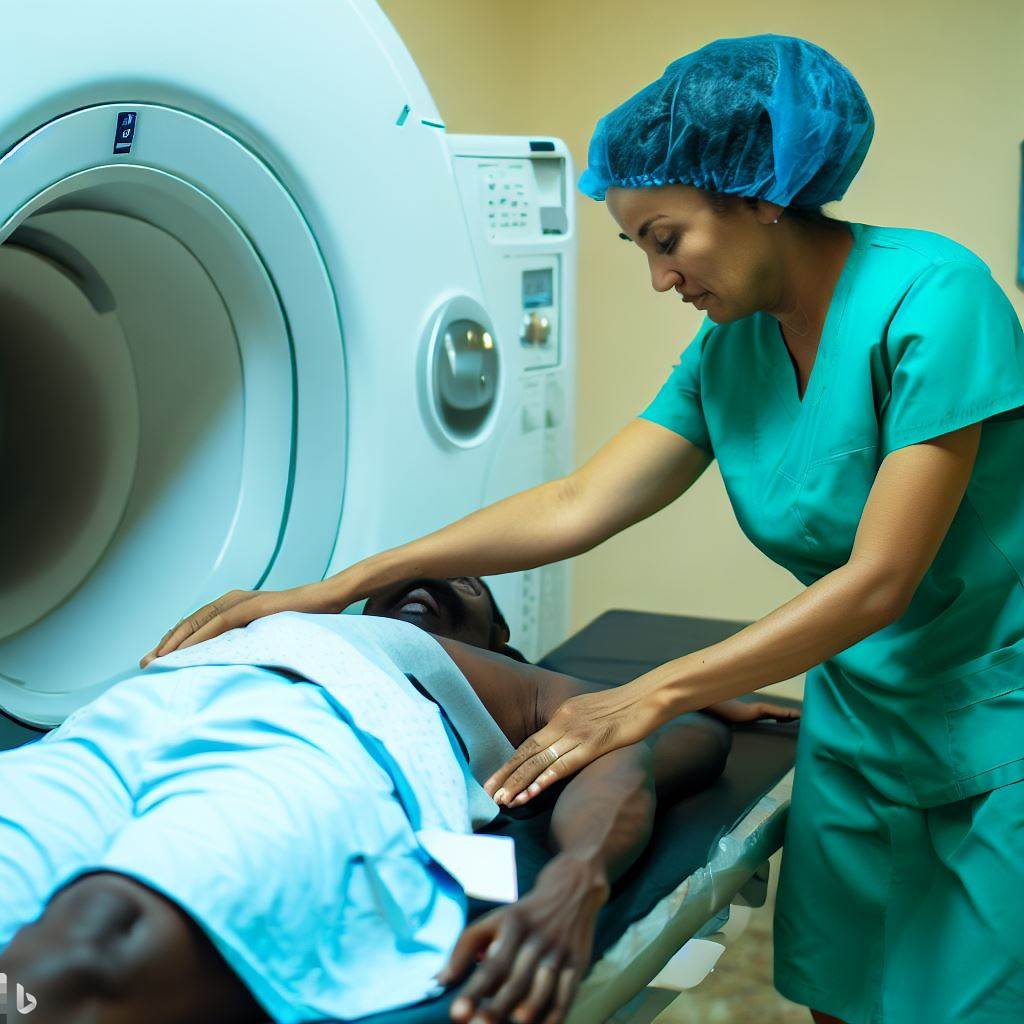Patient Care: An Essential Skill for MRI Techs in Nigeria
Last Updated on August 1, 2023
Introduction
Patient care is an essential skill for MRI techs in Nigeria, as it ensures a positive healthcare experience for patients.
These professionals are responsible for operating MRI machines, which enable them to obtain precise and detailed images of patients’ internal structures.
In Nigeria, patient care plays a crucial role in their job.
Patient care is essential for MRI techs in Nigeria as it ensures the comfort and well-being of patients during procedures.
Maintaining a high level of patient care is crucial in creating a positive and supportive environment for patients.
MRI techs must communicate effectively with patients, addressing their concerns and providing clear instructions.
Building rapport with patients helps to alleviate anxiety and ensures a smooth imaging process.
MRI techs should prioritize patient safety by following proper infection control protocols and ensuring equipment functionality.
Gentle handling and positioning of patients during procedures is necessary to avoid discomfort or injuries.
Patient care also involves precise data collection, including medical history and relevant information, to aid accurate diagnoses.
MRI techs in Nigeria should demonstrate empathy and compassion, showing sensitivity to patients’ cultural beliefs and diversity.
By prioritizing patient care, MRI techs contribute to the overall quality and effectiveness of medical imaging services in Nigeria.
The Role of MRI Techs in Nigeria
Overview of the responsibilities of MRI techs in Nigeria
MRI techs in Nigeria play a crucial role in providing patient care and assistance during MRI procedures.
They are responsible for:
- Operating and maintaining MRI equipment to ensure accurate scan results.
- Preparing patients for scans by explaining the procedure and answering their questions.
- Positioning patients correctly to obtain the needed images and minimize discomfort.
- Administering contrast agents when necessary, ensuring patient safety and monitoring for any adverse reactions.
- Monitoring patients during scans to ensure their well-being and address any patient concerns.
- Communicating effectively with radiologists and other medical professionals regarding the specific needs of each patient.
- Following strict safety protocols to protect both patients and themselves from radiation hazards.
- Maintaining accurate records of patient information, scan results, and other relevant data.
- Keeping up-to-date with advancements in MRI technology and techniques to provide the best possible care.
Technical skills required for the job
In addition to these responsibilities, MRI techs need to possess a range of technical skills to excel in their job:
- Technical Proficiency: MRI techs must have a thorough understanding of MRI principles, procedures, and equipment.
- Anatomy and Physiology: A solid grasp of human anatomy and physiology is essential to accurately interpret scan images and identify abnormalities.
- Patient Positioning and Comfort: MRI techs need to know how to position patients precisely for optimal imaging while ensuring their comfort throughout the procedure.
- Communication Skills: Effective communication is crucial when explaining the procedure to patients, addressing their concerns, and collaborating with other medical professionals.
- Attention to Detail: A keen eye for detail is necessary to catch potential errors in scan images and ensure accurate diagnosis.
- Problem-Solving Abilities: MRI techs should be able to troubleshoot technical issues and adjust scanning parameters when necessary.
- Adaptability and Stress Management: The ability to adapt to unexpected situations and handle the stress of working with patients who may be anxious or in pain is vital.
- Teamwork: MRI techs often work as part of a larger medical team, so they need to collaborate effectively and contribute to a positive work environment.
- Ethics and Professionalism: Maintaining patient confidentiality, adhering to professional standards, and practicing ethical behavior are essential aspects of the job.
In short, MRI techs in Nigeria have diverse responsibilities that revolve around providing exceptional patient care during MRI procedures.
Alongside technical skills, they must demonstrate excellent communication, problem-solving, and teamwork abilities to ensure the best outcomes for patients and contribute to the overall success of the healthcare team.
The Significance of Patient Care in MRI
Why patient care is essential in the field of MRI
In the field of MRI, patient care is not just important, it is absolutely essential.
Here’s why:
- Quality of Care: Patient care ensures that each individual receives the best possible treatment during their MRI procedure.
- Comfort and Safety: By prioritizing patient care, MRI techs ensure the comfort and safety of their patients throughout the process.
- Reliable Results: Patient care plays a crucial role in obtaining accurate and reliable MRI results.
- Building Trust: Excellent patient care builds trust between the healthcare provider and the patient, leading to better communication and cooperation.
- Reducing Anxiety: Providing compassionate care helps alleviate anxiety and stress for patients undergoing MRI scans.
- Minimizing Errors: Patient care protocols help minimize errors and complications during MRI procedures.
- Promoting Compliance: Effective patient care promotes patient compliance with the necessary instructions for a successful MRI scan.
Patient care not only impacts the individual patient but also enhances the overall healthcare experience:
- Improved Patient Satisfaction: Patients who receive proper care feel valued, leading to higher satisfaction levels.
- Positive Perception: Good patient care creates a positive perception of the healthcare facility and its staff.
- Better Outcomes: When patients feel cared for, they are more likely to follow recommendations, leading to better health outcomes.
- Efficient Workflow: Prioritizing patient care streamlines the workflow, leading to increased efficiency.
- Reduced Discomfort: Providing attention to patient needs minimizes physical discomfort and emotional distress.
- Enhanced Communication: Patient care facilitates effective communication between MRI techs and patients, resulting in a more accurate diagnosis.
- Personalized Care: Understanding and addressing patient concerns allows for personalized care and tailored treatment plans.
To achieve optimal patient care in the field of MRI, MRI techs must possess certain skills and qualities:
- Empathy: Being empathetic towards patients’ concerns and fears ensures they feel heard and understood.
- Effective Communication: Clear and concise communication helps build trust and foster cooperation.
- Technical Competence: Proficiency in MRI technology and procedures ensures accurate and reliable imaging results for proper diagnosis.
- Attention to Detail: Paying close attention to each patient’s needs and requirements helps avoid errors and potential complications.
- Problem-Solving Abilities: The ability to think critically and find solutions to challenges that arise during MRI procedures is crucial.
- Adaptability: MRI techs must be flexible and adapt to different patient personalities and situations.
- Continuous Learning: Staying updated with the latest advancements in MRI technology and patient care practices is essential for delivering high-quality care.
Generally, patient care is not just an essential skill but the foundation of providing excellent healthcare experiences in the field of MRI.
By prioritizing patient care, MRI techs play a crucial role in ensuring both the physical and emotional well-being of patients, leading to accurate results, improved outcomes, and overall satisfaction.
Read: Comparison: Home Health Aides vs. Nurses in Nigeria
Challenges Faced by MRI Techs in Nigeria
The specific challenges faced by MRI techs in providing patient care in Nigeria
MRI techs in Nigeria face specific challenges when it comes to providing patient care. These challenges include:
Limited Resources:
- Lack of adequate MRI machines, leading to longer wait times for patients.
- Insufficient supply of contrast agents, hampering the quality of imaging studies.
- Shortage of trained technicians, causing a burden on the existing staff.
Cultural Factors:
- Language barriers between techs and patients, hindering effective communication.
- Traditional beliefs and superstitions affecting patient cooperation and compliance.
- Misconceptions about MRI procedures, leading to fear and anxiety among patients.
Inadequate Training and Education:
- Limited access to specialized training programs for MRI techs in Nigeria.
- Insufficient continuing education opportunities to keep up with advancements in the field.
- Inadequate knowledge about MRI safety protocols, compromising patient well-being.
High Patient Volume:
- Overwhelming number of patients seeking MRI scans due to limited availability.
- Extended working hours, leading to fatigue and potential compromise in patient care.
- Difficulty in managing emergency cases alongside routine appointments.
Infrastructure Challenges:
- Frequent power outages, jeopardizing the functioning of MRI machines during scans.
- Inadequate maintenance of MRI equipment, causing breakdowns and delays in patient care.
- Limited access to necessary equipment and accessories, hindering accurate diagnosis.
Impact of limited resources and cultural factors
The impact of these challenges on patient care cannot be ignored. Limited resources and infrastructure can result in long waiting times, delayed diagnoses, and compromised quality of scans.
This poses a significant risk to patient outcomes and overall healthcare delivery.
Cultural factors add another layer of complexity for MRI techs in Nigeria.
Language barriers make it challenging to explain procedures, obtain patient history, and address concerns effectively.
Superstitions and misconceptions further hinder patient cooperation and may lead to avoidance or refusal of scanning.
The lack of adequate training and education exacerbates these challenges.
Without specialized programs and sufficient continuing education opportunities, MRI techs may struggle to keep up with new techniques and safety protocols.
This can compromise patient safety and contribute to misinterpretation of scans.
Overcrowded schedules and extended working hours increase the risk of errors and exhaustion.
Emergency cases complicate the situation further, as techs must handle critical situations while also attending to routine appointments.
To overcome these challenges, there is a need for strategic interventions.
Investment in infrastructure and the procurement of more MRI machines would ensure timely access to scans.
Adequate training programs and continuous education opportunities should be established to enhance the knowledge and skills of MRI techs.
Efforts should be made to address cultural factors by providing language interpretation services and patient education materials in local languages.
Community engagement initiatives could help dispel misconceptions and promote the importance of MRI scans for accurate diagnoses.
In general, MRI techs in Nigeria face a range of challenges that impede their ability to provide optimal patient care.
Limited resources, cultural factors, inadequate training, high patient volume, and infrastructure challenges all contribute to these difficulties.
However, with targeted interventions and improvements in these areas, the quality of patient care in Nigeria can be significantly enhanced.
Read: Stories from the Field: Interviews with Nigerian HHAs

Communication Skills for Effective Patient Care
Effective communication plays a vital role in providing quality patient care.
As MRI techs in Nigeria, it is essential to develop strong communication skills to ensure the well-being and satisfaction of our patients.
Here are some reasons why effective communication is crucial in patient care:
- Building trust and rapport: Clear and open communication helps establish trust and rapport with patients, making them more comfortable and willing to share important information.
- Understanding patient needs: Effective communication allows us to understand the needs, concerns, and expectations of our patients. By listening attentively, we can provide personalized care.
- Enhancing patient safety: Clear communication is essential for relaying critical information, such as allergies or medical history, to ensure patient safety during MRI procedures.
- Managing patient anxiety: Communication skills help in alleviating patient anxiety by explaining the procedure in a comforting manner and addressing any concerns they may have.
- Facilitating informed decision-making: Through effective communication, we can provide patients with necessary information about their conditions, allowing them to make informed decisions about their care.
Developing strong communication skills is an ongoing process. Here are some tips and strategies to enhance communication with patients:
- Active listening: Pay attention to patients, maintain eye contact, and provide verbal and non-verbal cues to show that you are listening and interested in what they have to say.
- Empathy and compassion: Display empathy and show genuine care for the patients. Understand their emotions and respond with kindness and compassion.
- Clear and simple language: Avoid medical jargon and use simple, easy-to-understand language when explaining procedures, test results, or any medical information to patients.
- Non-verbal communication: Be aware of your body language and facial expressions. Maintain a friendly and approachable demeanor to put patients at ease.
- Use visual aids: Utilize diagrams, illustrations, or models to explain complex medical concepts or procedures visually, making it easier for patients to understand.
- Ask open-ended questions: Encourage patients to express themselves by asking open-ended questions that go beyond a simple “yes” or “no” response. This promotes dialogue and deeper understanding.
- Provide reassurance: Offer emotional support and reassurance to patients who may be experiencing fear or anxiety. Let them know they are in good hands.
- Active engagement: Involve patients in their care by seeking their opinions and involving them in the decision-making process. This empowers them and promotes a sense of ownership.
- Clarify information: Check the patient’s understanding of the information provided by asking them to repeat or summarize what has been discussed.
- Continual improvement: Reflect on past experiences and seek feedback from patients to continuously improve communication skills and provide exceptional patient care.
In fact, effective communication is a fundamental skill for MRI techs in Nigeria to ensure quality patient care.
Building trust, understanding patient needs, enhancing safety, managing anxiety, and facilitating informed decision-making are essential aspects.
By actively listening, displaying empathy, using clear language, and engaging patients, we can develop strong communication skills that contribute to improved patient outcomes and overall satisfaction.
Creating a Positive Patient Experience
In order to provide excellent patient care, it is crucial for MRI techs in Nigeria to focus not only on the technical aspects of the examination but also on creating a positive patient experience.
By implementing various techniques, techs can help minimize patient anxiety and promote comfort throughout the MRI examinations.
Techniques to Create a Positive Patient Experience:
- Show Empathy: Techs should display empathy towards patients by actively listening to their concerns and addressing them promptly.
- Clear Communication: It is important to explain the procedure clearly, using non-technical language, to ensure patients fully understand what to expect during the MRI.
- Establish Trust: Building trust with patients is crucial. Techs should establish rapport, provide reassurance, and address any doubts or fears patients may have.
- Ensure Privacy: Respecting patient privacy by providing appropriate changing facilities and maintaining confidentiality creates a sense of comfort and trust.
- Comfortable Environment: Creating a calm and relaxing environment through proper lighting, temperature control, and soothing music can help ease patient anxiety.
- Pain Management: Taking necessary steps to minimize pain or discomfort during the procedure is essential. Using cushions or blankets can provide physical comfort to patients.
- Explain the Process: Before starting the MRI examination, techs should explain each step and provide patients with an opportunity to ask questions.
- Manage Waiting Time: Efficiently managing patient schedules and minimizing waiting times help reduce patient anxiety and enhance their overall experience.
- Continuous Monitoring: Regularly checking on the patient during the examination and promptly addressing their needs ensures their comfort and safety.
Ways to Minimize Patient Anxiety and Promote Comfort:
- Preparation: Offering detailed instructions on clothing restrictions, dietary guidelines, and any necessary preparations beforehand helps alleviate patient anxiety.
- Education: Providing educational resources such as brochures or pamphlets about MRI examinations can help patients understand the procedure better.
- Relaxation Techniques: Teaching patients relaxation techniques such as deep breathing exercises or guided imagery can help reduce anxiety and promote comfort.
- Distraction Methods: Offering distractions during the procedure, such as music or videos, can divert patients’ attention from the MRI environment.
- Sedation Options: In some cases, offering sedation options to patients with extreme anxiety or claustrophobia can greatly improve their experience.
- Post-Procedure Support: Following up with patients after the MRI examination, addressing any concerns, and providing necessary post-procedure instructions contributes to their overall comfort and satisfaction.
- Team Collaboration: Collaborating with other healthcare professionals, such as nurses or psychologists, can offer additional support for patients during the MRI process.
- Continuous Improvement: Regularly seeking feedback from patients and implementing necessary changes based on their suggestions ensures an ongoing improvement in patient care and experience.
By implementing these techniques and promoting a positive patient experience, MRI techs in Nigeria can not only provide high-quality diagnostic imaging but also contribute to the overall well-being and satisfaction of their patients.
Ultimately, patient care should always be prioritized to create a positive impact on the healthcare system as a whole.
Read: Nutritionist Profession in Nigeria: Gender and Diversity Aspects
Continued Education and Training for MRI Techs
Continued education plays a pivotal role in enhancing patient care skills for MRI techs in Nigeria.
Staying updated with the latest advancements in patient care ensures that techs provide the highest level of care to their patients.
To achieve this, MRI techs must be well-versed in empathetic communication and patient comfort techniques. Continuous training enables them to develop and refine these essential skills.
Workshops and seminars focused on patient care offer MRI techs valuable opportunities to learn from experienced professionals in the field.
Professional organizations like the Nigeria Association of Radiographers and Radiological Technologists (NARRT) also provide resources and support, conducting regular training programs and workshops on various aspects of MRI technology.
These initiatives enable techs to improve their patient care skills effectively.
Furthermore, online resources such as webinars and e-learning platforms are easily accessible, allowing techs to learn at their own pace while expanding their knowledge and understanding of patient care.
Engaging in case discussions and forums facilitates the exchange of ideas and experiences, contributing to their professional growth.
Collaboration with other healthcare professionals is another crucial aspect for MRI techs to improve their skills.
Interdisciplinary conferences and workshops offer opportunities to learn from experts in different fields, enhancing their understanding of patient care collaboration.
Interacting with doctors, nurses, and fellow techs enriches their holistic approach to patient well-being.
Hospital administrators have a vital role to play in supporting the continued education and training of MRI techs.
By providing funding and resources for professional development, techs gain access to the tools necessary for advancing their skills and knowledge.
In conclusion, patient care skills for MRI techs in Nigeria can be significantly improved through continued education and training.
Utilizing workshops, online resources, professional organizations, and collaboration with other healthcare professionals,
MRI techs can provide the highest level of care to their patients, ensuring their well-being and comfort throughout the MRI procedure.
This commitment to ongoing education not only benefits techs but also contributes to the overall quality of patient care in Nigeria.
Read: Stress Management Tips for Home Health Aides in Nigeria
Conclusion
Patient care is an essential skill for MRI techs in Nigeria, as it ensures a positive healthcare experience for patients.
MRI techs play a crucial role in providing compassionate care and ensuring patient comfort during the scanning process.
It is important to recap the significance of patient care for MRI techs in Nigeria.
By focusing on patient care, techs can alleviate anxiety and fear in patients, leading to better cooperation and accurate scan results.
Additionally, compassionate care helps build trust and rapport between techs and patients, fostering a positive healthcare environment.
Efforts to enhance patient care in the field should be encouraged.
This can be achieved through ongoing training and professional development programs that emphasize the importance of empathy and communication skills.
Techs should also be encouraged to actively engage with patients, addressing their concerns and providing clear information about the procedure.
Furthermore, the implementation of patient-centered policies and protocols can promote a culture of patient care in MRI departments.
This can include initiatives such as regular patient feedback surveys, where techs can gather insight and continuously improve their care practices.
In review, patient care is not just a responsibility but also an opportunity for MRI techs to make a positive impact on patients’ healthcare journey.
By prioritizing patient care, techs contribute to better patient outcomes and overall satisfaction.
Continuous efforts to enhance patient care are essential for the growth and success of MRI techs in Nigeria.


